Scientists are making great strides predicting when and where West Nile virus outbreaks will occur.
In South Dakota University, a team led by Dr, Michael Wimberly is refining a model which relies on ecological forecasting to understand how temperature, precipitation, and the greenness of vegetation can affect the severity of outbreaks during a specific season or in a given region.
“Basically, the colder it is, the harsher the winter, the less chance that you will have a big West Nile virus outbreak in the subsequent year,” said Wimberly.
On the other hand, according to Mike McLean, an entomologist at the Metropolitan Mosquito Control District in St. Paul, Minn, some parts of the country that have experienced snow packs will most likely get standing water in the spring which could increase mosquito populations in general.
According to the Centers for Disease Control and Prevention (CDC), there have been 2,374 people who got infected, of which 114 have died in the U.S. last year due to the West Nile Virus.





